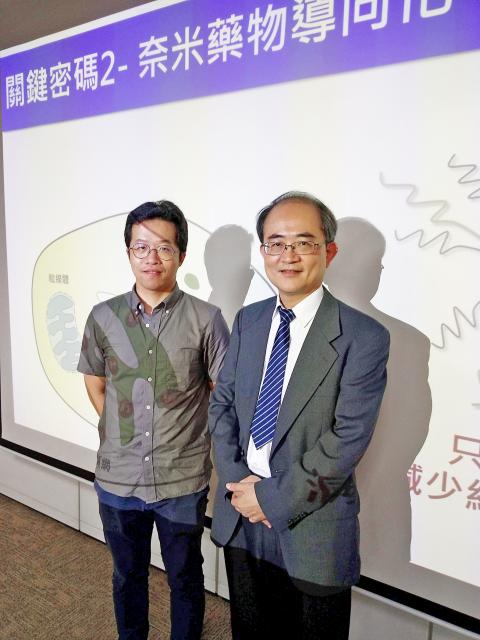A team of National Cheng Kung University (NCKU) researchers has developed a new therapy for a rare childhood immunodeficiency disorder that employs nanotechnology to enhance the use of curcumin as a medication.
Chronic granulomatous disease (CGD) affects nearly one in 200,000 births worldwide, and more than 10 Taiwanese children have the disease, pediatrician Shieh Chi-chang (謝奇璋), a professor of clinical medicine at the Tainan-based university who also works at the National Applied Research Laboratories, told a news conference yesterday at the Ministry of Science and Technology in Taipei.
Children with CGD suffer from repeated infections and could die at an early age, as there is no known cure, he said.

Photo: Wu Liang-yi, Taipei Times
Doctors often prescribe interferons in a bid to prevent more infections or recommend stem cell transplants, he said.
Seeking a more accessible and safer treatment, about six years ago he began researching using curcumin, which is extracted from turmeric roots, Shieh said.
Curcumin’s poor water solubility means it is not readily absorbed by the human body and there have been concerns that it might kill cells other than the targeted ones, he said.
His team eventually developed a method using nanotechnology to wrap curcumin with a more biocompatible material, allowing it to act on target bacteria, he said.
The medication has been tested on mice and he expects to complete clinical testing and commercialization in five years, he said.
He thanked current and former members of the team, including Deputy Minister of Science and Technology Shieh Dar-bin (謝達斌), for their work.
The method could be applied to other diseases with similar pathologies, Shieh Chi-chang told a reporter who asked if developing a cure for one rare disease was worth the effort.
The National Laboratory Animal Center has developed a bacterial artificial chromosome technique that can transfer nearly 200,000 base pairs of human genes into mice, a task few researchers in the world have achieved, center researcher Jiang Si-tse (蔣思澈) added.

ENDEAVOR MANTA: The ship is programmed to automatically return to its designated home port and would self-destruct if seized by another party The Endeavor Manta, Taiwan’s first military-specification uncrewed surface vehicle (USV) tailor-made to operate in the Taiwan Strait in a bid to bolster the nation’s asymmetric combat capabilities made its first appearance at Kaohsiung’s Singda Harbor yesterday. Taking inspiration from Ukraine’s navy, which is using USVs to force Russia’s Black Sea fleet to take shelter within its own ports, CSBC Taiwan (台灣國際造船) established a research and development unit on USVs last year, CSBC chairman Huang Cheng-hung (黃正弘) said. With the exception of the satellite guidance system and the outboard motors — which were purchased from foreign companies that were not affiliated with Chinese-funded

PERMIT REVOKED: The influencer at a news conference said the National Immigration Agency was infringing on human rights and persecuting Chinese spouses Chinese influencer “Yaya in Taiwan” (亞亞在台灣) yesterday evening voluntarily left Taiwan, despite saying yesterday morning that she had “no intention” of leaving after her residence permit was revoked over her comments on Taiwan being “unified” with China by military force. The Ministry of the Interior yesterday had said that it could forcibly deport the influencer at midnight, but was considering taking a more flexible approach and beginning procedures this morning. The influencer, whose given name is Liu Zhenya (劉振亞), departed on a 8:45pm flight from Taipei International Airport (Songshan airport) to Fuzhou, China. Liu held a news conference at the airport at 7pm,

AIR SUPPORT: The Ministry of National Defense thanked the US for the delivery, adding that it was an indicator of the White House’s commitment to the Taiwan Relations Act Deputy Minister of National Defense Po Horng-huei (柏鴻輝) and Representative to the US Alexander Yui on Friday attended a delivery ceremony for the first of Taiwan’s long-awaited 66 F-16C/D Block 70 jets at a Lockheed Martin Corp factory in Greenville, South Carolina. “We are so proud to be the global home of the F-16 and to support Taiwan’s air defense capabilities,” US Representative William Timmons wrote on X, alongside a photograph of Taiwanese and US officials at the event. The F-16C/D Block 70 jets Taiwan ordered have the same capabilities as aircraft that had been upgraded to F-16Vs. The batch of Lockheed Martin

GRIDLOCK: The National Fire Agency’s Special Search and Rescue team is on standby to travel to the countries to help out with the rescue effort A powerful earthquake rocked Myanmar and neighboring Thailand yesterday, killing at least three people in Bangkok and burying dozens when a high-rise building under construction collapsed. Footage shared on social media from Myanmar’s second-largest city showed widespread destruction, raising fears that many were trapped under the rubble or killed. The magnitude 7.7 earthquake, with an epicenter near Mandalay in Myanmar, struck at midday and was followed by a strong magnitude 6.4 aftershock. The extent of death, injury and destruction — especially in Myanmar, which is embroiled in a civil war and where information is tightly controlled at the best of times —